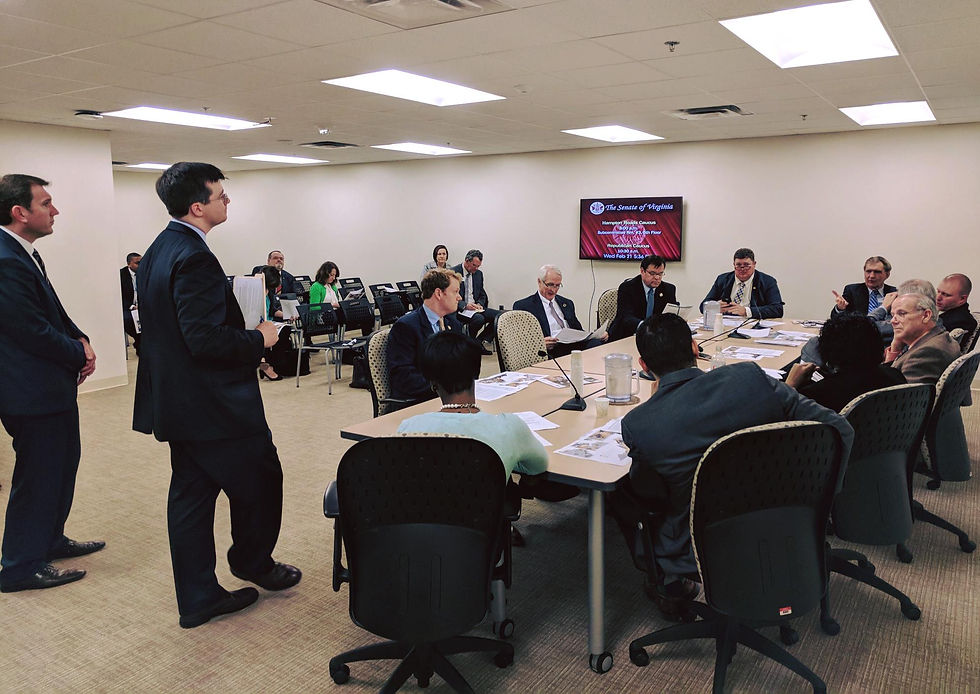Opportunity Zones and Legislative Updates Dominate Packed Agenda at Virginia Rural Caucus Meeting
- Kristie Proctor
- Feb 22, 2018
- 3 min read

Richmond, Va. – At the Rural Caucus meeting held on February 21, recent developments and time-sensitive deadlines around Opportunity Zones were a key focus of discussion, along with legislative updates and other topics.
The meeting welcomed a host of guest presenters, starting with Virginia Cooperative Extension Director Dr. Edwin Jones who provided a snapshot of the Cooperative Extension’s evolving mission and outlook for 2018.
Since 1914, the Cooperative Extension has focused on having viable agriculture production system, building healthy families and communities, and creating opportunities for youth to grow and be productive citizens. Jones said that programmatically, these tended to operate separately.
“But over the past couple of years, we’ve been talking about how to bring those separate pieces around, and bring them back together,” said Jones. “Because the issues today are interdisciplinary issues, and we have to work on that.”
Today, instead of speaking in terms of the four traditional program areas, the Cooperative Extension talks in terms of the economy, since agriculture and forestry make up “the biggest economic engine in the Commonwealth,” Jones said.
The organization also talks in terms of the community and food, families, and youth – where it touts the overall impact and fundamental value of the 4-H program.
“Many people think about livestock shows with 4-H, and yes, we do those,” said Jones. “But really, 4-H is about building youth capacity for the future.”
Following Jones’s remarks, the Rural Caucus welcomed back Virginia Department of Housing and Community Development (DHCD) Director Erik Johnston, who was joined by Virginia Economic Development Partnership (VEDPO Executive Vice President Jason El Koubi.
The two were on hand to provide important updates and valuable insight into the hot topic of the Opportunity Zone and Opportunity Fund, which collectively represent a new revitalization tool created by provisions in the Federal Tax Cuts and Jobs Act of 2017.
Johnston explained how the Zones and Funds will allow investors to receive federal tax benefits on currently unrealized capital gains by investing those gains in qualified census tracts (Opportunity Zones). While the federal government is responsible for defining the investment process, the Governor of each state has until March 21, 2018, to nominate 25 percent of qualified census tracts as Opportunity Zones.
In Virginia, some 840 census tracts are eligible for Opportunity Zone consideration, said Johnston, with the potential to spur economic development, particularly when combined with other initiatives.
“The national guidance suggest that these tax incentives in and of themselves won’t necessarily create a lot of movement of capital,” said Johnston. “But if they are layered on top of other state and local incentives or business-led efforts, it would create additional attractive incentives.”
Johnston said the tight federally mandated timeline of the program was a challenge. Unless extensions were granted, feedback from local government officials must be provided by Friday, March 2, 2018. More information on Opportunity Zones is available on the VA DHCD website.
Finally, attendees heard from Katie Frazier, President of the Virginia Agribusiness Council President and Martha Moore, Vice President of Governmental Relations at the Virginia Farm Bureau Federation who provided updates and asked for support on a variety of new agricultural-related bills making their way through the General Assembly session.
Touching on budget priorities, Moore called out support for agricultural best management practices (BMPs) as an area of positive development.
“Agriculture BMPs are important initiatives for both the Virginia Agribusiness Council and Virginia Farm Bureau,” said Moore. “We’re pleased to see $26.2 million budgeted, with another $3.5 for tech assistance.”
The Rural Caucus also welcomed Matt Strickler, Virginia Secretary of Natural Resources, who attended the meeting as an audience member participant.
Virginia Rural Caucus meetings are held each Wednesday at 5 p.m. in Senate Subcommittee Room #2, located on the 5th floor of the Pocahontas Building. For more information, visit the Center for Rural Virginia Events Calendar here. For more information, visit the Center for Rural Virginia Events Calendar here or contact Executive Director Kristie Proctor at kristie.helmickproctor@cfrv.org or (804) 512-1453.












Comments